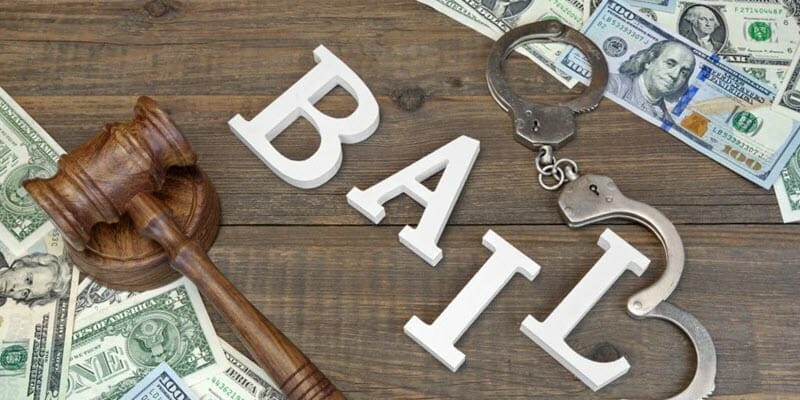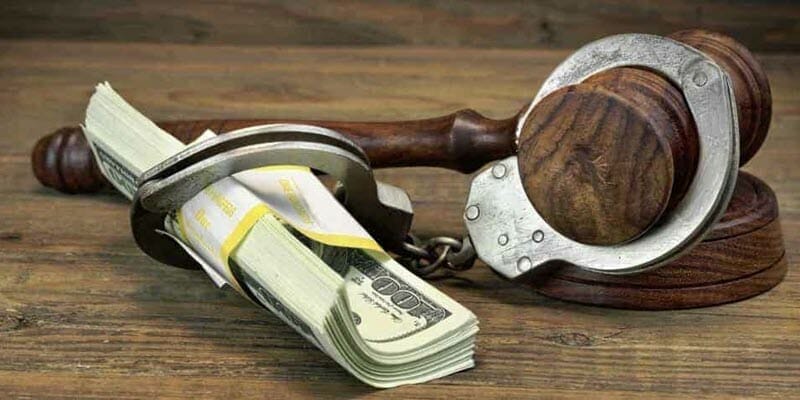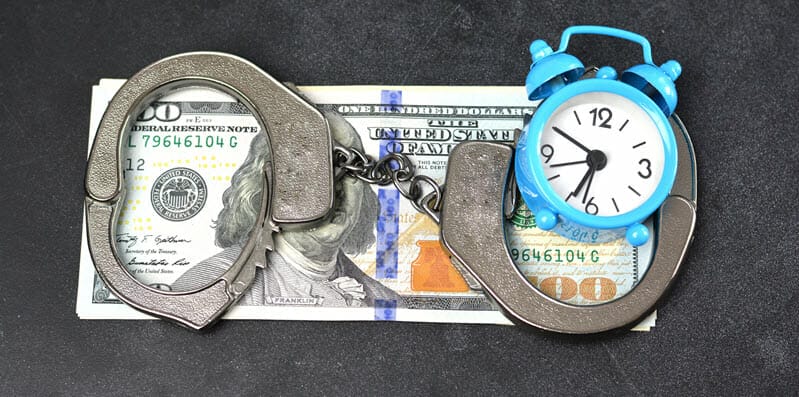
- Felonies
- *
- Misdemeanors
- *
- Drug/Narcotics Violations
- *
- Sex Offenses
- *
- Gun / Weapons Violations
- *
- Robbery
- *
- Burglary
- *
- Assault
- *
- Theft
- *
- White Collar Crimes
- *
- Domestic Assualt
- *
- Property Damage
- *
Do Judges Lower Bail For a Defendant?
When someone is charged with a crime and arrested, they have the right to bail in most cases, unless they have committed a violent crime that causes them to be a considerable danger to the community.
No one wants to sit around in a jail cell while awaiting trial or waiting to go through the legal process for their criminal case. Unfortunately, bail amounts are not always affordable, especially when there are serious charges or past criminal history.
While it is up to the court to determine the bail amount, the law stipulates that it cannot be excessive. If you feel it is excessive, you are probably wondering “do judges lower bail?”
What happens if you cannot afford bail? If the amount is set too high, what steps are necessary for getting it lowered? We understand navigating legal waters is often stressful, especially if you have never dealt with arrest and bail issues before.
What Does a Judge Consider When Setting the Bail Amount?
Before the accused can be released on bail and get out of jail, the court must decide on what to set bail at. Some criminal charges have set bail amounts in some states. This is called a bail schedule. In most states, the bail amount is up to the judge's discretion.
The following are some of the factors that will be considered during the bail hearing for the accused.
The seriousness of the alleged crime
The probability the accused will show up for all court dates
The degree of risk the defendant poses to the community (public safety)
The defendant's prior criminal record (any violent felony or only misdemeanors)
Judges are often given a lot of leeway when they set bail for the accused. In some cases, judges have the right to deny bail, especially if they feel the accused is a flight risk, has a criminal record, or will be a danger to the community or their victim.
How Can You Pay Bail?
Defendants have a handful of options for paying their bail. Paying bail is also called posting bail (bail bond). You have the following options as the accused.
Individuals have the right to post their entire bail bond using cash, credit cards, or checks. The full amount is typically refunded if a defendant shows up for court.
Defendants also have the right to hire a bondsman to get out of jail. The accused will be required to pay a percentage of the bail amount to the bondsman. This amount is not refunded and is considered payment for services rendered by the bondsman.
Defendants may also be released on their own recognizance. This means they simply sign a promise agreeing to show up for court and to the terms of their release.
Do Judges Lower Bail?
Judges may lower bail if they learn of new information they did not know about. While they can always reconsider bond, there is no obligation for them to change the bail amount.
If a loved one or friend's bail is set too high for them to pay, there are options for attempting to get reduced bail, though these options are not always a guarantee that the court will agree to a reduction.
Any defense attorney's first goal will be to secure bail for their client and ensure it is the lowest possible bail amount. An attorney will work to get bail reduced in the following ways.
Apply for a Bail Reduction at the Bail Hearing
The arraignment is the first appearance in court. The accused stands before the court and is informed of the criminal charges placed against them. The accused will put in a plea against these charges.
At the arraignment, the defense attorney may apply for a reduction in bail if it is not affordable. The attorney can bring in evidence, witnesses, and relevant facts to persuade the court to reduce bail.
Bail Reduction Motion
When the amount is set too high, the defendant's attorney has the option to file a motion for bail reduction. This motion may be filed based on statutory laws or constitutional factors and is done to request the amount of bail to be reduced.
Most states and the Constitution prohibit excessive bail amounts. The best method of winning a motion for bail reduction is to get an attorney involved from the very beginning. They will help the accused file a motion and hopefully win.
Motion to Reduce Bail Based on Change in Circumstance
An attorney may also file a motion to reduce bail based on a change in circumstances. For instance, if the defense attorney succeeds in getting some of the charges dropped or changed, the court may be willing to reduce the amount. The best way to win a bail reduction is to file the motion at the arraignment or during the initial hearing, if possible.
What Makes a Defendant a Flight Risk?
It is important to note that bail amounts are not set as punishments for defendants. They are meant to incentivize defendants to show up for their court dates. Posting bail makes a defendant more likely to show up for court because they want to be refunded their money.
If a defendant does not show up for their court date, they will not be refunded any amount. The court will also release a bench warrant so the defendant can be picked up by officers and brought back to jail to stand trial.
When a court considers the flight risk of a defendant, they will look at the following factors to determine if bail is granted or denied.
Does the accused live in the community?
Does the accused have a job in the community?
Is the bail high enough to discourage the accused from skipping court?
Has the accused promised they will appear for court?
Does the accused have a previous criminal record?
Does the accused have a history of skipping court dates?
How Does a Bail Reduction Hearing Work?
If a defendant cannot afford bail, are they going to be stuck in jail until their trial? Not always. There are legal limits on the amount of bail that can be set. Your attorney may be able to argue on your behalf and get the bail amount reduced significantly, though there is no guarantee.
At the hearing, the defendant or their attorney can argue that the bail amount was set too high for the criminal charges. The court must consider the information presented in court, but the court is not required to rule favorably. The court may decide to keep the bail at the initial amount.
The courts cannot violate the Bail Reform Act that was put in place in 1985. The court does have the option of setting the amount high enough, so the accused goes to great lengths to gather the money for bail. Incentivized bail amounts mean the accused is more likely to show up for all court dates.
When a defendant informs the court that the amount is too high and they cannot pay, the court must then respond in kind. The court must specify why the amount is indispensable for the defendant's release. This information must be provided to the defendant in writing and orally in court.
The Prosecution Can Ask That the Bail Be Increased
You must know, although you have the right as a defendant to request lower bail, the prosecution holds the same right. The prosecutor may ask the court to increase a defendant's bail.
The prosecution may petition the court for an increase if they feel the defendant is a flight risk or a danger to the community. As with motions filed by the defendant, it will be up to the court to make the final call on whether the amount is increased.
Can Bail Be Exonerated?
When bail is exonerated, this means all the money the defendant paid is returned to the defendant. If the defendant hired a bail bondsman or bail bonds company, they are not returned the fee, but all obligations to the bondsman are terminated. Bail may be exonerated for a defendant for the following reasons.
The defendant's case results in a dismissal or acquittal.
The defendant is convicted of the crime and sent to prison.
The defendant is surrendered to custody for a good cause.
What Causes Bail to Be Forfeited?
It is possible for bail to be forfeited to a defendant. If forfeited, the defendant does not get any of the money they paid refunded. In forfeiture cases, the state takes custody of the money paid by the defendant.
Bail may be forfeited if a defendant does not show up for court or they do not adhere to the terms of their release from jail. The defendant will also forfeit their money if they are arrested while out on bond.
Understanding the Conditions of Release on a Bail Bond
The court, at its discretion, may place certain terms on a defendant's release. As stated above, if the terms are not met, the bail is often forfeited. In some cases, failure to adhere to the release terms will result in arrest. The following are some of the common release terms charged to defendants.
The accused must surrender their passport.
The accused must surrender their driver's license.
If the accused is charged with a drug charge, they may be required to submit to drug testing.
The accused may be ordered to stay away from their alleged victim or any witnesses to the crime.
The accused may be required to wear an electronic monitoring device at all times.
When Is Bail Not Available?
Although most criminal defendants are given bail, some crimes result in bail denial. Bail may be denied in the following cases, depending on the state and the judge.
Capital crimes
Felonies and threat crimes
Violent felonies, such as sexual assault
Parole holds
Immigration holds
If bail is granted, it can be paid in cash, with a check, or with a credit card. Payment can be made with property in some cases, or with a bondsman.
Do You Need Help With Questions?
We hope that we answered the question of “do judges lower bail” and you have a better understanding of how this works. Keep in mind that most defendants have the right to post bail and get out of jail to await their trials. If the amount is too high, defendants have the right to seek methods of getting it reduced.
We understand it is difficult to go through the process of posting bail for a friend or loved one. You likely have a lot of questions and need answers fast.
We are here for you every step of the way and will work to make the process as easy as possible. Contact us today for a free consultation.







